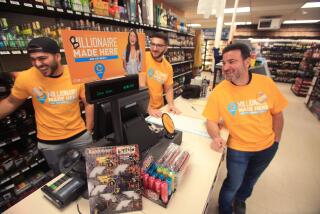Civic Groups Raise Funds With Games : ‘Monopoly’ Spinoffs Collect Cold Cash
Park Place is out. Reading Railroad is passe. The prime pickings on this Monopoly-style board game are Fox Video on Sequoia Avenue or Locktronic Security on Tracy Avenue.
The object of “Wheeler-Dealer: The Game of Simi Valley,” and similar games in Agoura and Conejo Valley, is still to accumulate money. But not the play stuff, and not for the players.
Several civic groups and organizations west of the San Fernando Valley are selling games personalized for their towns to raise money for the groups’ projects.
The results have been mixed. But the groups say the games seemed to tap a vein of civic pride. And at least it is a different way of raising money.
“Every fund-raiser group sells candy, raffle tickets and stuff like that,” said Carolyn Siracusa, president of the Conejo Swimming Assn., which used the games to raise money for the local swimming team. “It’s a unique game. It’s a history of your community.”
Hoped to Earn $21,000
Two years ago, Siracusa said, her group bought 2,000 Conejo Valley Wheeler-Dealer games, which featured Thousand Oaks and Westlake Village. The group wanted to earn enough to subsidize the team’s $21,000 in pool costs.
But sales have not gone as well as her group had hoped. Siracusa said the games sold well during the 1984 Christmas season, when 800 were bought by local shoppers. The total profit was $6,700. But few have been sold since, she said. None were sold this past Christmas.
Siracusa now hopes to persuade the local businesses featured on the board to help out by selling the games out of their offices. And reducing the original price of $12.50 by $2 may spark further sales, Siracusa said.
Rick Fields, director of the Simi Valley Boys and Girls Club, said 800 of the 1,000 Simi Valley versions of the game have been sold, raising $10,250. He said the club hopes to net another $2,750 from the games, which sell for $12.95 each. The money will be used for recreation programs.
“It’s the perfect gift for people who used to live in Simi,” Fields said. “They get it for the memory.”
Now Sold Sporadically
John Nicks led a fund-raising committee that sold a localized version of “The Millionaire Game” in 1984 to raise money for the Agoura High School Drama Department. The group ordered 400 games and has sold about half of them for nearly $4,000 in profit, Nicks said.
He said the group learned of the game from a representative of HENCO, the Selmer, Tenn., company that developed Millionaire. HENCO also gave tips on selling spaces and advertising. Late shipments of the game cut potential sales by about 75% during the 1984 Christmas season, and they are now being sold sporadically, Nicks said.
And because initial excitement over the game passed, selling them is becoming more difficult.
“It can only be done once in a community,” he said. “The value of it is the uniqueness of the idea.”
There are no plans to sell the game as an ongoing fund-raiser, Nicks said.
In Simi Valley’s game, Locktronic Security fetches the highest price: $50,000. Simi Valley Adventist Hospital gets only $2,000--surely no reflection on its contribution to the community. Locktronic and the hospital each paid $250 to be included on the game board, whereas the four corners were donated to Simi Valley City Hall, the Simi Valley Unified School District, Rancho Simi Recreational Park District and Strathern Historical House.
Card Picked on Each Toss
Unlike Monopoly, in which players pick cards when they land on Community Chest or Chance, in the Simi Valley game players select a card with each toss of the dice. If a player picks up the Taxi Service card, he or she is entitled to $800 from the “bank” and allowed to move to any space on the board. Or, if a player who owns all the property in one color picks up a Trustbuster card, he or she must sell one of the properties to the highest bidder and the bank gets the money.
As many as eight can play, rolling the dice for a chance to land on prime real estate and buy it. The player with the most holdings at the end wins.
Except for the names of the businesses, the Conejo Valley game is identical to the Simi Valley game because both are adaptations of Wheeler-Dealer, a game developed by Michael Glenn Productions of Allen Park, Mich. The Agoura game, which includes locations in Agoura and Westlake Village, is a version of The Millionaire Game.
Wheeler Dealer and Millionaire are based on Monopoly, invented by Charles Darrow of Germantown, Pa., in 1933, while he was out of work during the Depression. Monopoly has become the world’s most-famous board game, according to Encyclopaedia Americana, and still nets millions of dollars a year for Parker Brothers, which owns the copyright and trademark. Last year, national sales of Monopoly netted Parker Brothers $24 million, company spokesman Arthur Greenbaum said.
Use of Name Prohibited
HENCO, Michael Glenn Productions and others that produce the individualized games are prohibited from using the name Monopoly. Because of copyright laws, the companies are also not allowed to reproduce any of the markings of the original game, such as the color combination and the particular order and value of the properties on the board.
Parker Brothers, Greenbaum said, is aware that the firms are producing the hometown board games based on Monopoly, but he said his company is not concerned as long as they heed trademark and copyright laws.
Michael Glenn Productions and HENCO have obtained trademarks for their games and claim to have sold the game “to every state in the union,” as a spokesman for the Tennessee company put it. Although neither firm would disclose profits, representatives said national sales have increased annually.
Michael Glenn Kuzma, president of Michael Glenn Productions, said the company developed Wheeler-Dealer in 1980. Kuzma said he came up with the idea while unemployed.
First-Year Sales
Kuzma said he sold seven editions of the game the first year and has since sold 1,200 localized editions from Alaska to Hawaii and Canada at $5.60 a copy.
Gene Hebert, HENCO’s vice president of sales and marketing, said HENCO has produced and sold several fund-raising items to schools and athletic groups since 1969. He said the company developed Millionaire a little more than a year ago.
“We sell it as a keepsake item,” he said. “It’s a one-of-a-kind game.”
Hebert said HENCO has 150 representatives nationwide to advertise and distribute the game and has sold it to 350 cities. The cost to fund-raising groups, including production, packaging and shipping, is about $4,600 for 500 games, or $9.20 per game, Hebert said.
The company will produce only as many games as have been sold in advance by the fund-raisers. In the past, Hebert explained, groups became so enthusiastic about the idea of the game they would buy more than they could sell.
Hebert said the groups raise funds by selling the board’s realty spaces to the local businesses, usually at $175 for middle-of-the board spots to $400 for the corner spots.
More to Read
Inside the business of entertainment
The Wide Shot brings you news, analysis and insights on everything from streaming wars to production — and what it all means for the future.
You may occasionally receive promotional content from the Los Angeles Times.










